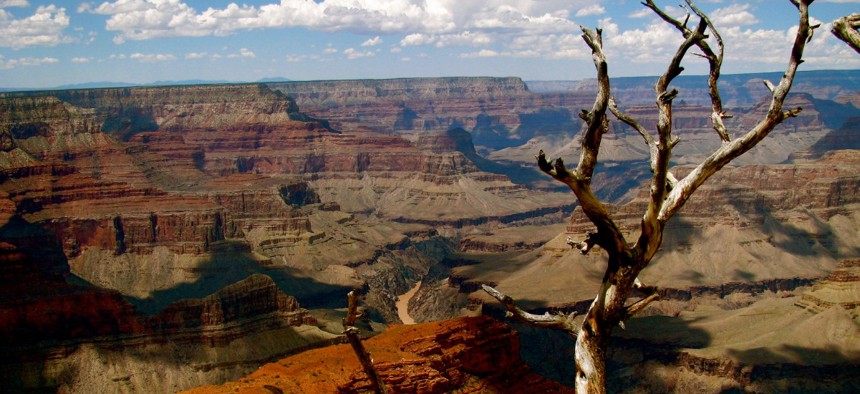
The Grand Canyon National Park is closed, but not all parks are. Corrie Jones / Interior Department file photo
The National Park Service Has Not Required All Locations to Close During Coronavirus, Despite Demands
Over 140 of 419 facilities are closed or have modified operations, but NPS is allowing some to remain open where possible.
Despite calls from lawmakers, union officials and advocates, the National Park Service has not mandated that all of its locations close during the novel coronavirus outbreak.
Over 140 of 419 facilities are closed or not offering visitor services, according to the agency. This includes major tourist destinations such as Yosemite, Grand Canyon and Yellowstone national parks. However, many say this is not enough because employees, volunteers and public visitors' health can be put at risk.
“The health and safety of NPS visitors, employees, volunteers and partners is our No. 1 priority,” an NPS spokesperson told Government Executive on Monday. “In most parks, operations have been modified in some way. This includes suspension of visitor services such as fee collection, ranger-guided tours and concessions operations, as well as closures of facilities such as visitor centers, museums and campgrounds.” However, “where it is possible to adhere to federal, state and local public health guidance, outdoor spaces will remain accessible to the public, and entrance-fee free,” which the Interior Department enacted on March 18.
NPS said park superintendents, NPS leaders and Interior Department officials make decisions about closures in accordance with Centers for Disease Control and Prevention and other public health guidance. Vice President Mike Pence said during a March 25 briefing the CDC would issue guidelines on social distancing at national parks on March 26, but the agency had yet to do that as of April 8.
The Park Service has received much pushback for not requiring all parks to close.
The Coalition to Protect America’s National Parks, which represents over 1,800 current, former and retired NPS employees and volunteers, is one example. “If you truly believe that the safety of park visitors and employees is the service’s ‘No. 1 priority’...then we plead with you to close the remaining parks now,” wrote Coalition Chair Philip Francis Jr., to acting NPS Director David Vela on April 2. This is “so that our many friends and colleagues who still work for this wonderful agency are not unnecessarily compromised and exposed to this horrible virus as it spreads across the land.”
Francis alleged “outside pressure” prompted NPS to close Grand Canyon National Park. Instead, “we ask that NPS demonstrate authentic concern for its employees and the public by closing the dozens of other parks that remain open today,” he wrote.
The coalition also requested that the agency start tracking and publicly reporting the number of confirmed coronavirus cases among employees. As of April 2, NPS had a total of 10 confirmed coronavirus cases. The agency has not responded to Government Executive’s recent requests for an update.
Similarly, Jeff Ruch, Pacific director for the nonprofit Public Employees for Environmental Responsibility, called NPS’ response to the pandemic “a fiasco,” based on his over 25 years of experience. “[Interior] Secretary [David] Bernhardt’s March decision to waive all national park entrance fees to encourage the public to ‘enjoy the outdoors’ illustrated a fundamentally misguided approach to encourage crowds in the teeth of a pandemic.”
Acting American Federation of Government Employees Local 2058 President Jeff Sievert–speaking on behalf of the larger council that represents many NPS employees in the Northwest Region–echoed these concerns.
“By keeping parks open it endangers people’s lives and health. It could prolong the outbreak of this virus and ravage healthcare facilities in areas that are ill equipped to handle the needs of patients who contract the virus,” Sievert said. Parks “should only reopen when it's safe for visitors to return.”
He added that employees “who are still required to perform essential services at these parks should be provided with proper [personal protective equipment] and hazard pay during this pandemic.”
Lastly, the Democrat-led House Natural Resources Committee has repeatedly called for the mass closures as well. “Warnings on the National Park Service website and the closure of some park facilities have not proven sufficient to protect public health, prompting grave concerns from federal employees and the local communities nearest our public lands,” committee members wrote to Bernhardt on March 31. “Many parks are located in rural areas where an outbreak would overrun community hospitals and their staff, making it imperative that we act now to reduce risk.”
Although park closures and modified operations are happening on a case-by-case basis, on April 3, NPS Deputy Director for Management and Administration Lena McDowall sent a memo to NPS commercial services regional chiefs placing a temporary moratorium on concession contracts and leases.
“It appears that travel restrictions, group gathering restrictions, and public and private closures will continue for the next few weeks,” she wrote. “Consequently, I am directing you to release no solicitations for concession contracts and leases through the end of May. We may extend this moratorium as the situation continues to evolve.”
Eric Katz contributed to the reporting.







